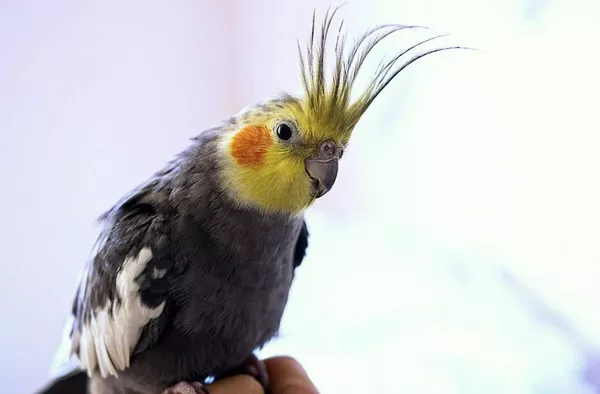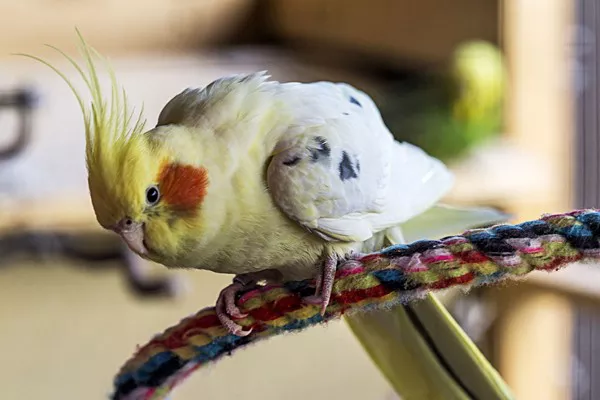Sun conures, also known as Aratinga solstitialis, are vibrant, intelligent, and affectionate birds that captivate pet owners with their colorful plumage and charming personalities. These parrots are not only beautiful but also highly social, and they often express themselves through various behaviors. One of the most endearing and common behaviors observed in sun conures is head-bobbing. This behavior can raise questions among bird owners: What does it mean when a sun conure bobs his head? Is it a sign of happiness, excitement, or something else entirely? In this article, we’ll dive into the world of sun conure head-bobbing, exploring its potential meanings, the reasons behind it, and how to interpret this behavior in a healthy and positive way for both the bird and its owner.
Understanding Sun Conures
Before we delve into head-bobbing, it’s important to understand the sun conure as a species. Sun conures are small to medium-sized parrots native to northeastern South America, particularly in regions like Venezuela and Brazil. They are known for their striking colors, including shades of yellow, orange, and green, which are often seen in their plumage. These birds are highly social and are often found in flocks in the wild. As pets, sun conures are known to bond strongly with their human caretakers and can be very affectionate, even forming close relationships with their owners.
Given their sociable nature, sun conures communicate not only with their voices but also through body language. Understanding this body language is crucial for anyone living with a sun conure, as it helps in recognizing when the bird is feeling happy, stressed, or unwell. One of the key forms of communication for sun conures is head-bobbing.
What Is Head-Bobbing?
Head-bobbing is a repetitive movement where the sun conure moves its head up and down in a rhythmic pattern. This behavior is not unique to sun conures; many other types of parrots and even some other species of birds engage in head-bobbing. While head-bobbing may seem like a quirky behavior, it has several meanings, depending on the context in which it occurs.
Common Reasons for Head-Bobbing in Sun Conures
Excitement and Happiness
One of the most common reasons for head-bobbing in sun conures is excitement or happiness. Birds are often very expressive when they are in a positive mood, and head-bobbing can be a form of self-expression for them. When your sun conure is bobbing its head, especially if it’s accompanied by other signs of excitement like chirping, hopping, or fluttering, it’s likely an indication that the bird is feeling playful and energetic.
For instance, your sun conure may bob its head when it sees you approaching, especially if it associates you with positive experiences like playtime, feeding, or attention. This type of head-bobbing is often a way for the bird to get your attention and invite you to engage with it.
Mating Behavior
Head-bobbing can also be linked to mating behavior. During the breeding season, many species of parrots, including sun conures, engage in various courtship displays to attract a mate. One such display is head-bobbing, which may be performed as part of a ritual to woo a potential mate.
If you have a pair of sun conures, or if your single sun conure is seeing its reflection or is exposed to other birds, the head-bobbing could be a sign of courtship. The bobbing is often accompanied by other behaviors, such as singing, feather fluffing, or dancing, which are meant to show the bird’s interest in a mate.
Request for Attention
Sun conures are known for their strong bonds with their human caretakers, and they thrive on attention. A sun conure may bob its head to request attention from you, whether it’s for petting, interaction, or simply to be noticed. The bird may bob its head when it is in close proximity to you, seeking acknowledgment or affection.
This head-bobbing may be especially noticeable if your bird has learned that such behavior leads to positive responses from you, such as a scratch behind the ears or a few minutes of playtime. In this case, head-bobbing becomes a learned behavior, as the bird associates it with the reward of your attention.
Feeding Behavior
Head-bobbing is sometimes seen in the context of feeding. In the wild, sun conures may bob their heads as part of their feeding rituals when they are looking for food. This behavior may continue in captivity, particularly when the bird is hungry or excited about mealtime.
If you notice your sun conure bobbing its head near its food bowl or when you’re preparing food for it, the bird could be signaling that it’s eager to eat or is ready for a snack. In some cases, birds may even mimic the head-bobbing behavior of their parents when they were chicks, seeking food or attention from their caregivers.
Stress or Anxiety
While head-bobbing is often a sign of positive emotions, it can sometimes indicate that a sun conure is feeling stressed or anxious. If a bird is uncomfortable or frightened, it may engage in a variety of unusual behaviors, including head-bobbing. This could be a sign that the bird is nervous or unsure about its environment.
For instance, if there is a sudden change in the bird’s routine, a loud noise, or the introduction of a new pet or person into the household, your sun conure might bob its head as a reaction to stress. If head-bobbing occurs in these contexts, it may be accompanied by other signs of distress, such as vocalizations, feathers puffing out, or retreating to a corner of the cage.
Health Issues (Less Common)
In some cases, head-bobbing can be a sign of health problems. While head-bobbing is often harmless, certain medical conditions can cause the bird to engage in this behavior in an unusual way. For example, if the bird is experiencing pain or discomfort, it might bob its head in a repetitive and exaggerated manner.
Conditions like respiratory infections, neurological disorders, or gastrointestinal issues could cause a sun conure to exhibit abnormal head-bobbing. If you notice that your bird’s head-bobbing is accompanied by other signs of illness, such as lethargy, loss of appetite, or changes in droppings, it’s important to consult with an avian veterinarian to rule out any health concerns.
How to Respond to Your Sun Conure’s Head-Bobbing
Understanding why your sun conure is bobbing its head is the first step in responding to the behavior in a positive way. Here are a few tips for managing this behavior:
Provide Regular Interaction and Attention
If your bird is bobbing its head to get your attention, make sure to provide regular social interaction, playtime, and affection. Sun conures thrive on companionship and attention, and responding to their cues helps build a strong bond with your bird. Spend time talking to your bird, playing with toys, or allowing it to explore in a safe, supervised environment.
Observe Context
Pay attention to the context in which the head-bobbing occurs. If the behavior is linked to excitement or happiness, encourage it by engaging in play or offering a treat. If it seems related to stress or anxiety, try to identify any sources of discomfort in the environment, such as loud noises, unfamiliar people, or changes in routine. Providing a stable and comfortable living space will help reduce anxiety-related behaviors.
Create a Stimulating Environment
Sun conures are highly intelligent and need mental stimulation to prevent boredom. Provide a variety of toys, climbing structures, and interactive activities to keep your bird engaged. A bird that is physically and mentally stimulated is less likely to engage in repetitive behaviors due to boredom or frustration.
Monitor for Signs of Illness
While head-bobbing is usually a normal behavior, it’s essential to monitor your bird for any signs of illness. If the head-bobbing becomes excessive, or if it’s accompanied by other unusual symptoms such as changes in behavior, eating habits, or droppings, it’s best to consult an avian veterinarian to rule out medical issues.
Conclusion
In summary, head-bobbing is a common and natural behavior for sun conures, and it can have a variety of meanings depending on the situation. Whether it’s a sign of excitement, a request for attention, a courtship display, or a response to stress, understanding the context of the behavior will help you interpret your sun conure’s body language more effectively. By observing your bird’s overall behavior and responding appropriately, you can ensure that your sun conure stays happy, healthy, and well-adjusted. Always remember that a happy sun conure is an engaged and content bird, so taking the time to understand and respond to its behaviors will strengthen the bond between you and your feathered friend.
Related Topics:






















